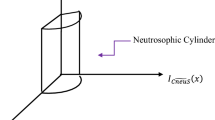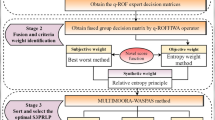Abstract
One of the main challenges faced by the industries in the global competitive environment is the supply chain management. Adoption of computer based decision making in supply chain management has become popular where multiple inputs and multiple outputs are involved in the process. In this paper, a fuzzy logic based approach is proposed for automating the decision-making in prioritizing the production and supply of boiler lining and insulation items to thermal power plants. The important lining and insulation items of steam generation boilers used for thermal power plants are considered in this work with a real-time approach and the bottlenecks involved in the supply chain are analysed in industrial perspective. The development of the fuzzy logic system for this prioritization and the proposed approach are well explained through a case study made in a boiler manufacturing industry. The results obtained from the proposed system are in agreement with expert opinion and this proposed system for automated decision making using fuzzy systems will definitely aid the supply chain management professional in project planning and scheduling in this field of manufacturing.




Similar content being viewed by others
Data availability
It is confirmed that no further data available with this paper.
References
Adjoul O, Benfriha K, Aoussat A (2019) Algorithmic strategy for optimizing product design considering the production costs. Int J Interact Des Manuf 13:1313–1329. https://doi.org/10.1007/s12008-019-00571-w
Alazemi FKAOH, Ariffin MKABM, Mustapha FB et al (2022) A New Fuzzy TOPSIS-Based Machine Learning Framework for Minimizing Completion Time in Supply Chains. Int J Fuzzy Syst. https://doi.org/10.1007/s40815-021-01226-3
Bezerra BP, Luz AP, Salomão R, Pandolfelli VC (2022) Low-melting-point polymeric fiber performance as drying additives for refractory castables. Ceram Int 48(3):3504–3514
Czvetko T, Kummer A, Ruppert T, Abonyi J (2022) Data-driven business process management-based development of Industry 4.0 solutions. CIRP J Manuf Sci Technol 36:117–132
Darshan Kumar, Jagdev Singh, Om Pal Singh, Seema (2013) Fuzzy logic based decision support system for evaluation of suppliers in supply chain management practices. Mathematical and Computer Modelling 58 (11–12)
Fortunet C, Durieux S, Chanal H et al (2020) Multicriteria decision optimization for the design and manufacture of structural aircraft parts. Int J Interact Des Manuf 14:1015–1030. https://doi.org/10.1007/s12008-020-00685-6
Guo K, Hao Xu (2021) A unified framework for knowledge measure with application: From fuzzy sets through interval-valued intuitionistic fuzzy sets. Appl Soft Comput 109:10753
Hanif MN, Rosdi M, Hasrulnizzam W, Mahmood W, Razik MA, Kamat SR (2021) Fuzzy analytic hierarchical process implementation on enhancing manufacturing responsiveness. J King Saud Univ - Eng Sci. https://doi.org/10.1016/j.jksues.2021.10.006
Hendri Dwi Saptioratri Budiono, Rahmat Nurcahyo, Muhammad Habiburrahman (2021) Relationship between manufacturing complexity, strategy, and performance of manufacturing industries in Indonesia. Heliyon 7 (6). https://doi.org/10.1016/j.heliyon.2021.e07225
Henao R (2022) William Sarache’, Sustainable performance in manufacturing operations: The cumulative approach vs trade-offs approach’. Int J Prod Econ 244:108385. https://doi.org/10.1016/j.ijpe.2021.108385
Hussein M, Eltoukhy AEE, Karam A, Shaban IA, Zayed T (2021) Modelling in off-site construction supply chain management: A review and future directions for sustainable modular integrated construction. J Clean Prod 310:127503
Julio C (2021) Serrano-Ruiz, Josefa Mula, Raul Poler, ’Smart manufacturing scheduling: A literature review’. J Manuf Syst 61:265–287. https://doi.org/10.1016/j.jmsy.2021.09.011
Khan SA, Naim I, Kusi-Sarpong S, Gupta H, Idrisi AR (2021) A knowledge-based experts’ system for evaluation of digital supply chain readiness. Knowledge-Based Systems 228:107262
Lei N (2022) Intelligent logistics scheduling model and algorithm based on Internet of Things technology. Alex Eng J 61(1):893–903
Li Yu, Wang S, Qiang Xu (2022) Optimal scheduling for simultaneous refinery manufacturing and multi oil-product pipeline distribution. Comput Chem Eng 157:107613
Marconi M, Menghi R, Papetti A et al (2021) An interactive resource value mapping tool to support the reduction of inefficiencies in smart manufacturing processes. Int J Interact Des Manuf 15:211–224. https://doi.org/10.1007/s12008-021-00753-5
Maria E (2021) Mondejar et al, ‘Digitalization to achieve sustainable development goals: Steps towards a Smart Green Planet.’ Sci Total Environ 794:148539
Moayyedian M, Abhary K, Marian R (2018) Optimization of injection molding process based on fuzzy quality evaluation and Taguchi experimental design. CIRP J Manuf Sci Technol 21:150–160
Moncef Krarti, Integrated Design of Energy Efficient Cities (2018) Optimal Design and Retrofit of Energy Efficient Buildings, Communities, and Urban Centers. Butterworth-Heinemann 471–545
Yazdani M, Torkayesh AE, Chatterjee P, Fallahpour A, Montero-Simo MJ, Araque-Padilla RA, Wong KY (2022) A fuzzy group decision-making model to measure resiliency in a food supply chain: A case study in Spain, Socio-Economic Planning Sciences, 82, Part B
Omair M, Noor S, Tayyab M et al (2021) The Selection of the Sustainable Suppliers by the Development of a Decision Support Framework Based on Analytical Hierarchical Process and Fuzzy Inference System. Int J Fuzzy Syst 23:1986–2003
Reda Hiluf, Dvivedi Akshay (2022) ‘Decision-making on the selection of lean tools using fuzzy QFD and FMEA approach in the manufacturing industry. Expert Syst Appl 192:116416. https://doi.org/10.1016/j.eswa.2021.116416
Rokhforoz P, Fink O (2021) Distributed joint dynamic maintenance and production scheduling in manufacturing systems: Framework based on model predictive control and Benders decomposition. J Manuf Syst 59:596–606. https://doi.org/10.1016/j.jmsy.2021.04.010
Swati N, Kamble B (2021) Rajiv, ‘Significance of risk priority number in machine condition monitoring.’ Mater Today: Proc. https://doi.org/10.1016/j.matpr.2021.09.317
Thenarasu M, Rameshkumar K, Rousseau J, Anbuudayasankar SP (2022) Development and analysis of priority decision rules using MCDM approach for a flexible job shop scheduling A simulation study. Simul Model Pract Theory 114:102416
Tong Huagang, Zhu Jianjun (2022) ‘A novel method for customer-oriented scheduling with available manufacturing time windows in Cloud Manufacturing. Robot Computer-Integrated Manuf 75:102303. https://doi.org/10.1016/j.rcim.2021.102303
Veiga GL, Pinheiro E, de Lima JR, da GouveaFrega Costa SE (2021) A DEA-based approach to assess manufacturing performance through operations strategy lenses. Int J Prod Econ 235:108072
Wang Z-Y, Cong Lu (2021) An integrated job shop scheduling and assembly sequence planning approach for discrete manufacturing. J Manuf Syst 61:27–44. https://doi.org/10.1016/j.jmsy.2021.08.003
Wang KJ, Lestari YD, Tran VNB (2017) Location Selection of High-tech Manufacturing Firms by a Fuzzy Analytic Network Process: A Case Study of Taiwan High-tech Industry. Int J Fuzzy Syst 19:1560–1584. https://doi.org/10.1007/s40815-016-0264-z
Wang W, Song J, Chen J et al (2022) Service design touch point failure model and effect analysis based on the triangular fuzzy number evaluation method. Int J Interact Des Manuf. https://doi.org/10.1007/s12008-021-00822-9
Zixuan Chen, Ahmed W.A. Hammad, Steven Travis Waller, Assed Naked Haddad (2023) Modelling supplier selection and material purchasing for the construction supply chain in a fuzzy scenario-based environment. Automation in Construction 150
Author information
Authors and Affiliations
Corresponding author
Ethics declarations
Conflict of interest
On behalf of all authors, the corresponding author states that there is no conflict of interest.
Additional information
Publisher's note
Springer Nature remains neutral with regard to jurisdictional claims in published maps and institutional affiliations.
Rights and permissions
Springer Nature or its licensor (e.g. a society or other partner) holds exclusive rights to this article under a publishing agreement with the author(s) or other rightsholder(s); author self-archiving of the accepted manuscript version of this article is solely governed by the terms of such publishing agreement and applicable law.
About this article
Cite this article
Nadanakumar, M., Parthiban, P. Fuzzy based supply chain management system for intelligent manufacturing prioritization of boiler insulation items. J. of Data, Inf. and Manag. 5, 165–175 (2023). https://doi.org/10.1007/s42488-023-00095-9
Received:
Accepted:
Published:
Issue Date:
DOI: https://doi.org/10.1007/s42488-023-00095-9




